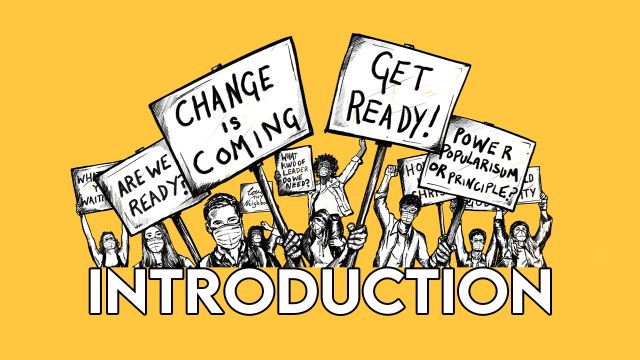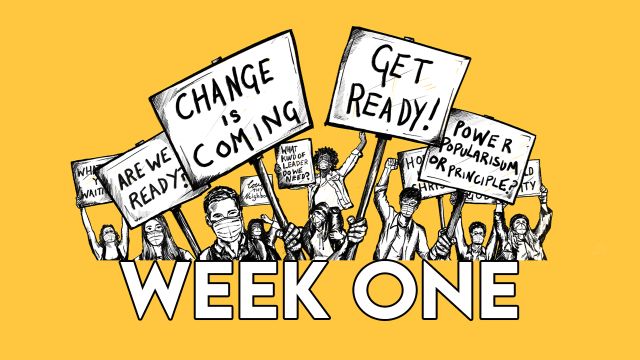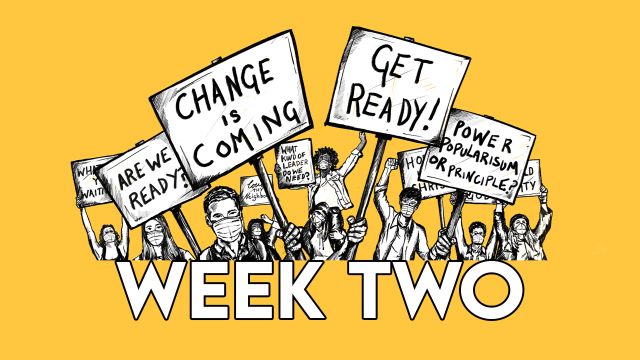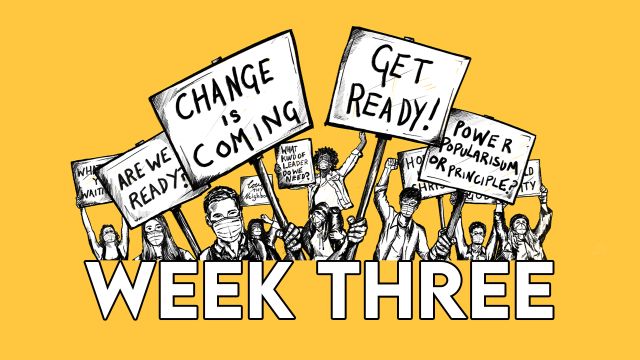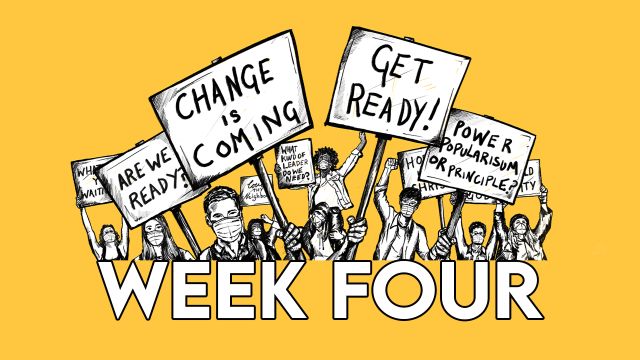Change Is Coming, Get Ready - Connect Groups
Introduction
Introduction
 We invite you to follow along with us as we explore our new theme 'Change is Coming, Get Ready' on Sanctuary First. You can use this material as a group or choose follow this bible study and journey on your own.
We invite you to follow along with us as we explore our new theme 'Change is Coming, Get Ready' on Sanctuary First. You can use this material as a group or choose follow this bible study and journey on your own.
Using a sequence of four stories from the book of 1 Samuel, and highlighting one in particular each week, we will be exploring what it means for Christians today to help shape and challenge the power structures of our modern world in order that all creation might flourish.
These stories ask what kind of leaders do we need to grow and encourage? What changes must we start to champion, and challenge governments and individuals to take on board? Why do we pray ‘Thy Kingdom Come‘ if not to effect change?
Find how to get involved: Connect group Blog
Week One
Part 1: In a changing world we trust in the providence of an omnipotent God
Read 1 Samuel 2: 1-10 and Psalm 113
 It is fascinating to read our key reading for this week — Hannah’s song in 1 Samuel — alongside Psalm 113. The two texts closely echo one another thematically and structurally.
It is fascinating to read our key reading for this week — Hannah’s song in 1 Samuel — alongside Psalm 113. The two texts closely echo one another thematically and structurally.
Looking at the two passages side by side what are the similarities? What are the differences? Does reading one give you insights into the other?
Read Acts 16: 22-34
Mind-altering, body-altering, life-altering… singing praises to God affects the chemistry and mood in our minds, bodies and lives. This is vividly depicted here in this reading where Paul and Silas are belting out the tunes and a literal earthquake comes crashing through!
Often we sing to keep our spirits up, to motivate and encourage ourselves to keep going with a task. Sung worship can serve a dual purpose: offering praise to God while also inspiring us to face the world and the challenges we meet. Are there particular songs that empower and inspire you to go out and serve God?
Read Acts 12: 1-17
Peter and Rhoda are both gobsmacked by what has just happened, but both of them carry on: Peter following the angel and Rhoda running to tell the others. It takes a while for the event to fully sink in — Peter can’t quite believe it at first and Rhoda is so overwhelmed she forgets to open the door and let him in — but that doesn’t stop them engaging in the new reality.
What can we learn from how Peter and Rhoda respond to extraordinary circumstances?
Week Two
Part 2: In a changing world, you choose: Power, Popularism, or Principle
Read 1 Samuel 8: 4-20
We are currently living through a time of great upheaval and uncertainty globally. Will we choose wisely who governs us across politics, culture and society over the coming years?
And what role does the church have in fostering a culture of responsible leadership?
 Read Psalm 138 (twice)
Read Psalm 138 (twice)
Reading the above text out loud twice what one word leaps out at you? Why did it strike you?
Read 2 Corinthians 4: 13-5:1
What are the unseen, eternal things that help you to take heart through difficult times?
Week Three
Part 3: In a changing world... What kind of leader?
Read 1 Samuel 16: 1-13
There’s seven interviewees. Seven on the ballot. Seven on the shortlist. Seven to choose from.
Except there isn’t. There’s eight.
How often do we stop and look for the eighth, or eighty-eighth candidate? The person who isn’t even in the running, who hasn’t been put forward, but is, despite appearances, exactly the right person for the job?
When it comes to leadership how do we balance the importance of experience and qualifications with the fact that the right person for the position might be someone who is outside the box — someone we aren’t even paying attention to or noticing? And how do we best seek God’s wisdom in making these decisions?

Read Psalm 20
Verse seven in the NRSVA translation is “Some take pride in chariots, and some in horses, / but our pride is in the name of the Lord our God.” In the NIVUK translation is is: “Some trust in chariots and some in horses, / but we trust in the name of the Lord our God.”
What are the things that our leaders today take pride in? Or put their trust in?
Read Mark 4: 26-29
When we think about the word 'kingdom’ we tend to associate it with borders and territories — a kingdom is a fixed area that we can draw on a map. But this tiny three verse parable describes a kingdom that is scattered and quietly growing and flourishing all the time even when we aren’t paying attention. It’s mysterious and hard to quantify.
We humans love drawing lines, setting boundaries and making plans. How can we lead our lives and churches and communities in such a way that we are more open to the mysterious, generous, uncanny ways of God? Ways that often surprise us.
Week Four
Part 4: In a changing world, are we ready
Read 1 Samuel 17: 1-50
(yep 50 verses, let’s look at the whole story, if you’re in a group you may want to break the reading up and take turns reading sections of it)
This is one of the most memorable and widely recognised encounters in the Bible. But let’s focus on one odd detail: the pile of cheese. While ‘David and Goliath’ is a familiar trope in pop culture it’s fair to say people’s first thought when they think of the story probably isn’t “Oh yeah, the kid that had to carry all that cheese.” (See verse 18.)
But carry cheese David did, and a big pile of it. While Saul and Eliab and Abinadab and Shammah and the rest are all engaged in the standoff with the Philistines, David has a job to do — two jobs in fact — he’s juggling looking after sheep and taking cheese to the frontline and before long he’s volunteered for a third job. We know reading this story that David is a plucky underdog hero but the people around him didn’t. He was just an awkward dude that smelled of cheese.
In the fast changing world we are now living in — which features many Goliaths to overcome — are we paying attention to the folk schlepping cheese around? And by that we mean the hardworking people on the fringes who we have been taking for granted.
How can we ensure that we are listening to the ‘young Davids’ around about us — the quirky souls outside the mainstream — that may well have the solutions to the big problems we face?
 Read Psalm 133
Read Psalm 133
Inspired by this psalm, what are three things we can do tomorrow to build up unity? It could be unity at home, unity at work, unity in the church, unity in society… As a group think of practical things you can do to work for unity.
Discuss
As we look to the future what are our prayers for this time of change? What are we wanting to let go of? And what are we wanting to hold on to?




